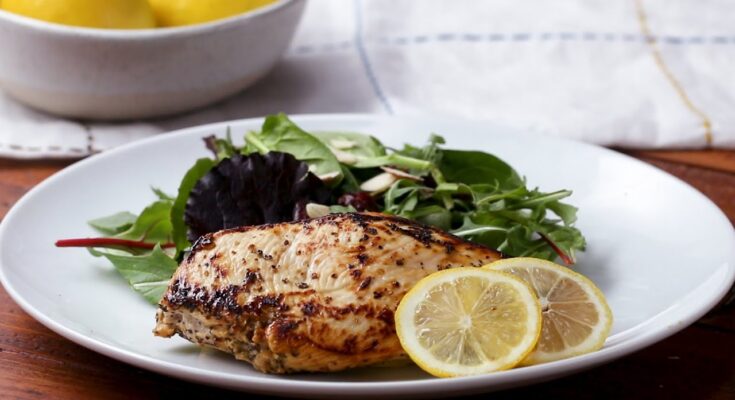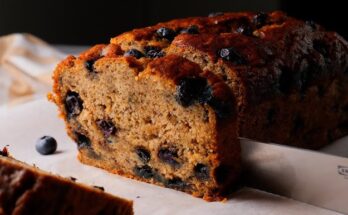Marinated Chicken Recipe: Marinated chicken is one of those timeless dishes that works for almost any occasion—family dinners, weekend barbecues, or even quick meal preps for the week. The beauty of marinated chicken lies in its versatility. With just a handful of simple ingredients and some patience, you can transform plain chicken into a flavorful, juicy, and mouthwatering dish. In this detailed guide, you’ll learn everything from the ingredients you need to a step-by-step method, along with tips and variations to try. Whether you’re a beginner or an experienced cook, this recipe will help you master marinated chicken like a pro.
Introduction to Marinated Chicken
Why Marinating Chicken Matters
Chicken on its own has a mild flavor, which makes it the perfect canvas for marinades. Marinating isn’t just about flavor—it’s also about texture. A well-made marinade tenderizes the meat, making it softer, juicier, and more enjoyable to eat. The acids in ingredients like lemon juice, vinegar, or yogurt break down proteins in the chicken, while oils keep it moist during cooking. On top of that, the spices and herbs infuse into the chicken, giving it depth and richness.
Think of marinating chicken as giving it a spa treatment. Without it, chicken might taste plain or even dry after cooking. But with the right marinade, every bite bursts with flavor. Whether you want smoky barbecue chicken, spicy grilled chicken, or a light lemon-herb chicken for salads, marinating is the key to unlocking those flavors.
Flavor Profiles You Can Create
One of the best parts about marinating chicken is how customizable it is. With just a few swaps in ingredients, you can create countless variations. For example:
- Mediterranean-inspired: Olive oil, lemon juice, garlic, oregano, and thyme.
- Asian-inspired: Soy sauce, sesame oil, ginger, and garlic.
- Spicy Mexican: Chili powder, lime juice, cumin, and paprika.
- Classic barbecue: Tomato paste, vinegar, brown sugar, and smoked paprika.
Marinating chicken opens the door to global cuisines, allowing you to travel with your taste buds without leaving your kitchen.
Ingredients You’ll Need for Marinated Chicken
Essential Ingredients for the Marinade
When preparing marinated chicken, you’ll need a few core ingredients that form the base of most marinades:
- Acid: Lemon juice, vinegar, or yogurt (to tenderize the chicken).
- Oil: Olive oil, canola oil, or avocado oil (to lock in moisture).
- Seasonings: Salt, pepper, garlic, and onion powder (to enhance flavor).
- Herbs/Spices: Paprika, cumin, oregano, thyme, rosemary, or chili flakes (to add personality).
These ingredients are the backbone of any marinade. The acid softens, the oil protects, and the seasonings flavor the chicken inside and out.
Optional Add-ons for Extra Flavor
Want to take your marinade to the next level? Try adding:
- Honey or brown sugar for sweetness and caramelization.
- Soy sauce or Worcestershire sauce for umami depth.
- Mustard for tang and sharpness.
- Fresh herbs like cilantro, parsley, or basil for brightness.
- Chili paste or hot sauce for a fiery kick.
These optional ingredients can dramatically change the taste profile of your chicken, making each batch unique.
Choosing the Right Chicken Cuts
Not all chicken cuts are created equal when it comes to marinating. Here’s a quick breakdown:
- Chicken breasts: Lean, mild flavor, best for lighter marinades (lemon herb, garlic yogurt).
- Chicken thighs: Juicier, more flavorful, great for bold marinades (spicy, BBQ).
- Chicken drumsticks or wings: Perfect for grilling or baking with sticky marinades (honey mustard, teriyaki).
- Whole chicken or spatchcocked chicken: Great for roasting after marinating overnight.
Choosing the right cut ensures the marinade complements the meat instead of overpowering it.
Step-by-Step Guide to Making Marinated Chicken
Step 1 – Preparing the Chicken
Start by selecting your preferred cut of chicken—breasts, thighs, drumsticks, or wings all work well. Trim away any excess fat and rinse lightly if desired, then pat the chicken dry with paper towels. Dry chicken absorbs marinade better and cooks more evenly.
Step 2 – Making the Marinade
In a mixing bowl, combine olive oil, lemon juice, minced garlic, salt, pepper, and dried herbs like oregano, thyme, or rosemary. For extra flavor, you can add soy sauce, honey, paprika, or chili flakes depending on whether you want it savory, sweet, or spicy. Whisk the ingredients together until smooth.
Step 3 – Marinating the Chicken Properly
Place the chicken in a resealable plastic bag or shallow dish. Pour the marinade over the chicken, making sure each piece is well coated. Seal or cover, then refrigerate for at least 30 minutes. For the best results, marinate for 4–8 hours or even overnight—this allows the flavors to fully infuse and tenderize the meat.
Step 4 – Cooking the Chicken (Grill, Bake, or Pan-Fry)
- Grill: Preheat your grill to medium-high. Cook the chicken for 5–7 minutes per side, depending on thickness, until golden and cooked through.
- Bake: Preheat oven to 375°F (190°C). Place chicken in a baking dish and cook for 25–35 minutes, until the internal temperature reaches 165°F (74°C).
- Pan-Fry: Heat a little oil in a skillet over medium-high heat. Cook chicken for 5–6 minutes per side until browned and fully cooked.
Step 5 – Serving Suggestions
Once cooked, let the chicken rest for a few minutes before serving. Pair it with fresh salads, roasted vegetables, rice, or flatbreads. You can also slice marinated chicken and use it in sandwiches, wraps, or pasta dishes for a versatile meal.
Tips for Perfect Marinated Chicken
How Long Should You Marinate?
Timing makes all the difference when marinating chicken. For thin cuts like chicken breasts, 2–4 hours is usually enough. For thicker cuts like thighs or drumsticks, aim for 6–12 hours. Whole chicken benefits from an overnight soak. But avoid going beyond 24 hours, as acids can break down proteins too much, leading to a mushy texture.
If you’re short on time, even a 30-minute quick marinade can make a noticeable difference. Just make sure to increase the intensity of spices and seasonings for shorter marinating times.
Common Mistakes to Avoid
Even simple recipes can go wrong if you overlook the details. Here are some pitfalls to avoid:
- Over-marinating: Leads to mushy chicken.
- Too much salt: Can dry out the meat. Balance with oils or yogurt.
- Not patting chicken dry before cooking: Excess marinade can burn, leaving bitter flavors.
- Cooking straight from the fridge: Let chicken rest at room temperature for 15–20 minutes before cooking for even heat distribution.
- Skipping the thermometer: Guessing if chicken is done often leads to dry or undercooked meat.
By paying attention to these small details, you’ll end up with perfectly juicy, flavorful chicken every time.
Variations of Marinated Chicken Recipes
Spicy Marinade
If you love heat, go for a spicy marinade. Mix chili powder, cayenne pepper, paprika, garlic, lime juice, and olive oil. This bold mix infuses chicken with fiery flavors that are perfect for grilling or roasting. Add a touch of honey if you want to balance the heat with a hint of sweetness.
Lemon Herb Marinade
This is a refreshing and light option. Combine lemon juice, zest, olive oil, garlic, thyme, and rosemary. It’s perfect for summer barbecues or when you want something bright and zesty. Works especially well with chicken breasts and drumsticks.
Garlic Yogurt Marinade
Yogurt-based marinades are amazing for tenderizing chicken while keeping it moist. Mix plain yogurt, minced garlic, cumin, coriander, and lemon juice. This marinade gives the chicken a creamy, tangy coating that pairs beautifully with grilled veggies or rice.
Honey Mustard Marinade
Sweet and tangy lovers will enjoy this one. Combine honey, Dijon mustard, olive oil, garlic, and a pinch of paprika. This marinade caramelizes beautifully when baked or grilled, leaving the chicken sticky, golden, and flavorful.
Health Benefits of Marinated Chicken
Nutritional Value
Marinated chicken isn’t just delicious—it’s also a nutritious choice when prepared the right way. Chicken is a lean source of protein, which means it helps build muscle, keeps you full for longer, and supports healthy metabolism. A single serving of chicken breast can pack around 25–30 grams of protein with very little fat, making it a staple in balanced diets.
When you marinate chicken, you also add nutritional benefits from the ingredients. For example, lemon juice adds vitamin C, garlic has natural antibacterial properties, and olive oil provides healthy fats that are good for your heart. Yogurt-based marinades offer probiotics, which support gut health. Even herbs like rosemary and thyme bring antioxidants into the mix.
Unlike heavy fried foods, marinated chicken can be cooked using healthier methods such as grilling, baking, or air-frying, reducing excess calories from oil. This makes it a smart choice for weight management, athletes, and anyone who wants flavorful meals without guilt.
Healthier Cooking Options
The way you cook marinated chicken also affects its health profile. Instead of deep frying, opt for these methods:
- Grilling: Reduces fat as it drips off during cooking.
- Baking: Uses minimal oil, keeps nutrients intact.
- Air-frying: Mimics fried texture with far less oil.
- Steaming: Locks in moisture without extra fat.
By pairing marinated chicken with sides like roasted vegetables, quinoa, or fresh salads, you get a wholesome meal packed with nutrients, flavor, and satisfaction.
FAQs about Marinated Chicken Recipe
1. Can I freeze marinated chicken?
Yes! You can freeze chicken directly in its marinade. Just place everything in a freezer bag, remove excess air, and store for up to 3 months. When ready, thaw in the fridge overnight and cook as usual.
2. What is the best way to store leftovers?
Cooked marinated chicken should be stored in an airtight container in the fridge for up to 3–4 days. Reheat gently on the stove or in the oven to maintain juiciness.
3. Can I reuse leftover marinade?
It’s not safe to reuse marinade that’s touched raw chicken unless you boil it first to kill bacteria. However, a safer option is to set aside some fresh marinade before adding the raw chicken, and use that as a sauce later.
4. Is marinated chicken good for meal prep?
Absolutely. You can prepare large batches of marinated chicken, cook them, and store in meal containers with veggies or grains. They stay fresh for days and make healthy eating so much easier.
5. Which cooking method makes marinated chicken juiciest?
Grilling and baking lock in flavor, but pan-searing followed by oven finishing often gives the juiciest results. Using a meat thermometer to avoid overcooking is the real secret to keeping chicken moist.
Conclusion
Marinated chicken is one of the easiest yet most rewarding dishes you can prepare. With just a little effort, you can transform simple chicken into a meal bursting with flavor, juiciness, and versatility. From spicy marinades to refreshing lemon herb blends, the options are endless. Following the proper steps—preparing the chicken, mixing a balanced marinade, marinating for the right time, and cooking with care—ensures that your chicken turns out perfectly every single time.
Whether you’re grilling for a backyard barbecue, baking for a cozy family dinner, or prepping meals for the week ahead, marinated chicken adapts beautifully to every occasion. Plus, with its nutritional benefits and countless variations, it’s a dish you’ll never get bored of. So grab your favorite ingredients, whip up a marinade, and let your chicken soak in all the goodness—you’ll taste the difference in every bite.



